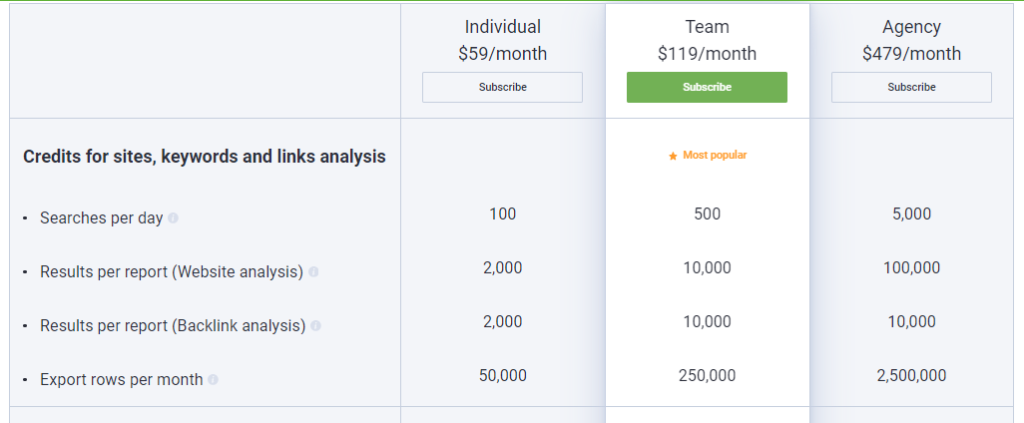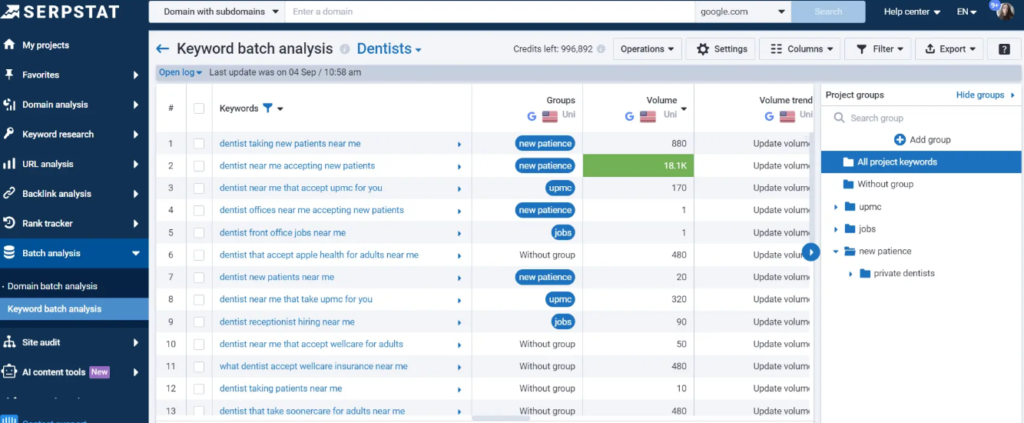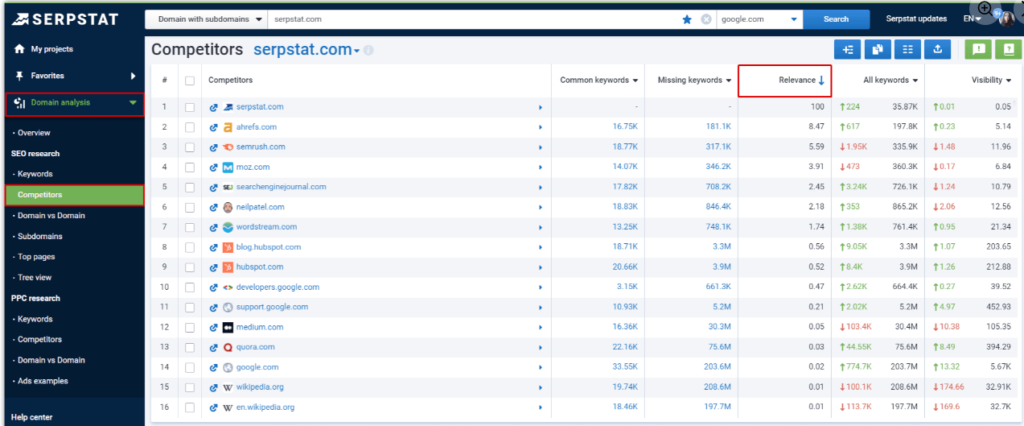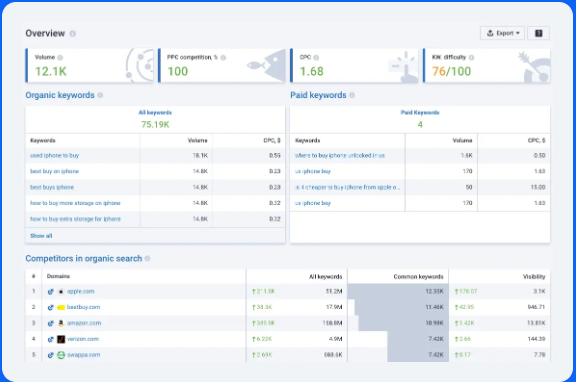Introduction
SEMrush vs Serpstat: When it comes to navigating the dynamic landscape of digital marketing and SEO tools, choosing the right platform can make all the difference in your strategy’s success. In this comparison, we delve into the strengths and capabilities of two prominent tools: SEMrush and Serpstat. Whether you’re aiming to optimize your SEO efforts, fine-tune your PPC campaigns, or enhance customer engagement, understanding how SEMrush vs Serpstat stack up against each other will help you make an informed decision tailored to your business needs.
Table of Contents
Pricing Plans: SEMrush vs Serpstat
When evaluating SEO tools, one of the critical factors to consider is pricing. In this section, we’ll compare the pricing plans of SEMrush and Serpstat to help you determine which tool offers better value for your investment.
SEMrush Pricing Plans
SEMrush offers three main pricing plans:
- Pro Plan: $139.95 per month
- Suitable for freelancers, startups, and in-house marketers.
- Features include 5 projects, 500 keywords to track, and 10,000 results per report.
- Guru Plan: $249.95 per month
- Ideal for SMBs and growing marketing agencies.
- Includes 15 projects, 1,500 keywords to track, and 30,000 results per report.
- Additional features: Content Marketing Platform, Historical Data, and extended limits.
- Business Plan: $499.95 per month
- Best for large agencies and enterprises.
- Offers 40 projects, 5,000 keywords to track, and 50,000 results per report.
- Advanced features: API Access, Google Data Studio Integration, and more.
SEMrush also provides a custom Enterprise plan for businesses with specific needs, offering tailored solutions and pricing.

Serpstat Pricing Plans
Serpstat offers a tiered pricing structure with plans tailored to different business needs:
Individual Plan: $59 per month
- Ideal for small businesses and individuals.
- Features include 4,000 queries per day, 10 projects, and 15,000 keyword results per report.
Team Plan: $119 per month
- Perfect for in-house marketing teams and freelancers.
- Includes 5,000 queries per day, 50 projects, and 60,000 keyword results per report.
- Additional features: branded reports and access to historical data.
Agency Plan: $479 per month
- Best suited for large marketing teams and agencies.
- Offers 12,000 queries per day, 100 projects, and 250,000 keyword results per report.
- Premium features: priority support and extended API credits.

Comparison and Value for Money
When comparing SEMrush vs Serpstat, it’s clear that both tools cater to different budgets and requirements. SEMrush tends to be on the pricier side but offers more advanced features and greater limits, making it a strong choice for larger businesses and agencies. On the other hand, Serpstat provides more affordable plans, making it accessible for smaller businesses and individuals who still need robust SEO capabilities.
User Interface and Ease of Use: SEMrush vs Serpstat
When choosing an SEO tool, the user interface (UI) and ease of use are crucial factors. A well-designed UI can significantly improve your workflow, making it easier to access and utilize the tool’s features. In this section, we’ll compare the user interface and ease of use of SEMrush and Serpstat to help you decide which tool offers a better user experience.
SEMrush User Interface
SEMrush boasts a comprehensive and professional-looking interface designed for efficiency.
Key Features of SEMrush’s UI:
- Dashboard Layout: The dashboard provides a clear overview of your projects, allowing you to quickly access essential data and reports.
- Navigation: The left-side navigation panel is organized into various categories such as SEO, Advertising, Social Media, and Content Marketing, making it easy to find specific tools and features.
- Customization: Users can customize the dashboard to prioritize the metrics and reports most relevant to their needs.
- Data Visualization: SEMrush excels in presenting data visually through charts, graphs, and tables, making complex information easier to digest.
Despite its robust features, SEMrush’s extensive options can be overwhelming for beginners. However, once you become familiar with the tool, the navigation and functionality become intuitive and straightforward.
Serpstat User Interface
Serpstat offers a clean and user-friendly interface, making it accessible for users of all experience levels.
Key Features of Serpstat’s UI:
- Dashboard Design: The dashboard provides a clear snapshot of your SEO performance, with easy access to key metrics and reports.
- Navigation: The top navigation bar is divided into main sections like Website Analysis, Keyword Research, Backlink Analysis, and Rank Tracking, facilitating easy access to various tools.
- Ease of Use: Serpstat’s interface is designed to be intuitive, allowing users to quickly understand and utilize its features without a steep learning curve.
- Data Presentation: Similar to SEMrush, Serpstat uses charts, graphs, and tables to present data in a visually appealing and comprehensible manner.
While Serpstat’s interface is more straightforward and beginner-friendly, it may lack some of the advanced customization options available in SEMrush. However, this simplicity can be advantageous for users who prefer a more streamlined experience.
Keyword Research: SEMrush vs Serpstat
Keyword research is a fundamental aspect of SEO, providing insights into the terms and phrases that potential customers use to find information online. In this section, we’ll compare the keyword research capabilities of SEMrush and Serpstat to determine which tool offers superior functionality and data accuracy.
SEMrush Keyword Research
SEMrush is renowned for its powerful keyword research tools, offering a comprehensive suite of features to help you identify and analyze keywords effectively.
Key Features of SEMrush’s Keyword Research:
- Keyword Overview: Provides a detailed analysis of any keyword, including search volume, keyword difficulty, CPC, and competitive density.
- Keyword Magic Tool: Generates extensive keyword lists based on a seed keyword, with filters for word count, difficulty, and search volume.
- Keyword Gap Analysis: Allows you to compare keyword profiles of up to five competitors, identifying opportunities and gaps in your keyword strategy.
- Keyword Difficulty: Analyzes how hard it is to rank for a specific keyword, helping you prioritize your efforts.
SEMrush also provides keyword variations, questions, and related keywords, giving you a holistic view of your keyword landscape. The data is presented in an organized manner, making it easy to understand and act upon.

Serpstat Keyword Research
Serpstat offers robust keyword research capabilities, with a focus on simplicity and usability.
Key Features of Serpstat’s Keyword Research:
- Keyword Analysis: Provides essential metrics like search volume, keyword difficulty, competition level, and CPC.
- Related Keywords: Generates a list of keywords related to your seed keyword, helping you discover new opportunities.
- Search Suggestions: Offers keyword suggestions based on search engine autocomplete data, providing insight into long-tail keywords.
- Keyword Trends: Shows the popularity trend of a keyword over time, helping you identify seasonal or trending terms.

Competitor Analysis: SEMrush vs Serpstat
Competitor analysis is a critical component of any SEO strategy, allowing you to understand your competitors’ strengths and weaknesses and identify opportunities to outperform them. In this section, we’ll compare the competitor analysis features of SEMrush and Serpstat to help you determine which tool offers better insights and functionality.
SEMrush Competitor Analysis
SEMrush is known for its comprehensive competitor analysis tools, providing detailed insights into your competitors’ online strategies.
Key Features of SEMrush’s Competitor Analysis:
- Domain Overview: Offers a snapshot of any competitor’s domain, including organic and paid search traffic, backlinks, and top-performing keywords.
- Traffic Analytics: Provides detailed insights into a competitor’s website traffic, including traffic sources, user behavior, and top pages.
- Organic Research: Analyzes a competitor’s organic search performance, highlighting top keywords, positions, and SERP features.
- Backlink Analysis: Examines a competitor’s backlink profile, including referring domains, anchor texts, and new and lost backlinks.
- Advertising Research: Reveals competitors’ paid search strategies, including ad copy, keywords, and traffic estimates.

SEMrush also offers tools like the Keyword Gap Analysis and Backlink Gap Analysis, allowing you to identify keyword and backlink opportunities by comparing your domain with competitors.
Serpstat Competitor Analysis
Serpstat provides robust competitor analysis tools, focusing on simplicity and ease of use.
Key Features of Serpstat’s Competitor Analysis:
- Competitor Graph: Visual representation of your competitors, showing their relative strength in organic and paid search.
- Domain Analysis: Offers an overview of a competitor’s domain, including search visibility, traffic, and top-performing keywords.
- Keyword Analysis: Identifies keywords for which your competitors are ranking, providing insights into their organic search strategy.
- Backlink Analysis: Examines a competitor’s backlink profile, highlighting referring domains, anchor texts, and new and lost backlinks.
- Top Pages: Identifies a competitor’s top-performing pages, giving you insights into their most successful content.

Comparison and Insights
When comparing SEMrush vs Serpstat for competitor analysis, both tools offer valuable features, but they cater to different needs.
- SEMrush: Ideal for users who need in-depth competitor insights and advanced analysis tools. SEMrush’s comprehensive data and detailed reports make it suitable for experienced marketers and large agencies.
- Serpstat: Perfect for users who prefer a straightforward and easy-to-use interface. Serpstat provides essential competitor analysis features, making it a great choice for beginners or those who need quick insights.
Backlink Analysis: SEMrush vs Serpstat
Backlink analysis is essential for understanding the quality and quantity of links pointing to your website, which can significantly impact your search engine rankings. In this section, we’ll compare the backlink analysis capabilities of SEMrush and Serpstat to determine which tool provides more comprehensive insights and functionality.
SEMrush Backlink Analysis
SEMrush offers a robust set of tools for analyzing backlinks, providing detailed insights into your link profile.
Key Features of SEMrush’s Backlink Analysis:
- Backlink Overview: Provides a comprehensive snapshot of your backlink profile, including total backlinks, referring domains, and anchor texts.
- Referring Domains: Identifies the domains linking to your site, along with metrics like domain authority and the number of backlinks.
- New and Lost Backlinks: Tracks the acquisition and loss of backlinks over time, helping you understand changes in your link profile.
- Anchor Text Analysis: Analyzes the anchor texts used in backlinks, providing insights into the keywords and phrases associated with your site.
- Backlink Audit Tool: Identifies toxic backlinks that could harm your site’s rankings and helps you create a disavow file for Google.
Serpstat Backlink Analysis
Serpstat provides powerful backlink analysis features, focusing on simplicity and ease of use.
Key Features of Serpstat’s Backlink Analysis:
- Backlink Dashboard: Offers an overview of your backlink profile, including total backlinks, referring domains, and anchor texts.
- Referring Domains: Lists the domains linking to your site, along with metrics like trust rank and the number of backlinks.
- New and Lost Backlinks: Monitors the acquisition and loss of backlinks over time, helping you stay informed about changes in your link profile.
- Anchor Text Analysis: Examines the anchor texts used in backlinks, providing insights into the keywords associated with your site.
- Domain vs. Domain: Compares your backlink profile with competitors, helping you identify gaps and opportunities for link building.
Content Marketing Tools: SEMrush vs Serpstat
Content marketing is a pivotal strategy for driving organic traffic, engaging your audience, and establishing your brand authority. Both SEMrush and Serpstat offer robust content marketing tools to help you create, optimize, and track your content. In this section, we’ll compare the content marketing tools of SEMrush and Serpstat to help you decide which tool best suits your needs.
SEMrush Content Marketing Tools
SEMrush provides an extensive suite of content marketing tools designed to streamline your content creation and optimization process.
Key Features of SEMrush’s Content Marketing Tools:
- Topic Research: Generates content ideas and headlines based on a seed keyword, providing insights into trending topics and popular questions.
- SEO Writing Assistant: Offers real-time recommendations for optimizing your content, including keyword usage, readability, and tone of voice.
- Content Audit: Analyzes the performance of your existing content, identifying opportunities for optimization and improvement.
- Post Tracking: Monitors the performance of your published content across multiple channels, tracking metrics like social shares, backlinks, and keyword rankings.
- Brand Monitoring: Tracks online mentions of your brand, helping you understand how your content is perceived and shared.

SEMrush’s content marketing tools are designed to provide a comprehensive overview of your content strategy, from ideation to performance tracking, ensuring that your content efforts are effective and aligned with your SEO goals.
Serpstat Content Marketing Tools
Serpstat offers a range of content marketing tools aimed at simplifying content creation and optimization.
Key Features of Serpstat’s Content Marketing Tools:
- Content Marketing Ideation: Provides content ideas based on a seed keyword, helping you discover popular topics and trends.
- SEO Text Analytics: Analyzes your content for SEO optimization, offering recommendations for keyword usage, structure, and readability.
- Content Performance Tracking: Monitors the performance of your content, tracking metrics such as traffic, social shares, and engagement.
- Competitor Content Analysis: Analyzes the content strategies of your competitors, identifying top-performing content and content gaps.
- SERP Analysis: Examines the search engine results pages (SERPs) for your target keywords, providing insights into the type of content that ranks well.
PPC (Pay-Per-Click) Tools: SEMrush vs Serpstat
Pay-Per-Click (PPC) advertising is a crucial component of many digital marketing strategies, offering immediate visibility and a measurable return on investment. Both SEMrush and Serpstat provide powerful PPC tools to help you create, manage, and optimize your PPC campaigns. In this section, we’ll compare the PPC tools of SEMrush and Serpstat to help you decide which platform best suits your needs.
SEMrush PPC Tools
SEMrush offers a comprehensive set of PPC tools designed to enhance your advertising efforts and improve your campaign performance.
Key Features of SEMrush’s PPC Tools:
- Keyword Research for PPC: Identifies high-performing keywords for your campaigns, including metrics like CPC, competition level, and search volume.
- Ad Builder: Helps you create compelling ad copy by analyzing top-performing ads in your niche and offering optimization suggestions.
- Ad History: Tracks the performance of your competitors’ ads over time, providing insights into their strategies and adjustments.
- PLA Research: Analyzes Product Listing Ads (PLAs) to identify trends, top-performing products, and competitor strategies.
- Campaign Management: Offers tools for tracking and optimizing your PPC campaigns, including bid management and performance analysis.

SEMrush’s PPC tools provide detailed insights into keyword performance, competitor strategies, and ad optimization, making it easier to create and manage successful PPC campaigns.
Serpstat PPC Tools
Serpstat also offers robust PPC tools, focusing on simplicity and ease of use.
Key Features of Serpstat’s PPC Tools:
- PPC Keyword Research: Identifies valuable keywords for your campaigns, including CPC, competition level, and search volume.
- Ad Analysis: Analyzes your competitors’ ads to provide insights into their strategies, ad copy, and performance.
- Competitor PPC Research: Tracks and analyzes your competitors’ PPC campaigns, offering insights into their keyword choices and ad placements.
- Budget Management: Helps you manage your PPC budget by providing detailed cost estimates and performance metrics.
- Ad Performance Tracking: Monitors the performance of your PPC ads, offering insights into click-through rates, conversion rates, and overall effectiveness.

Comparison and Insights
When comparing SEMrush vs Serpstat for PPC tools, both platforms offer valuable features, but they cater to different needs.
- SEMrush: Ideal for users who need a comprehensive suite of PPC tools. SEMrush provides advanced features for keyword research, ad building, and competitor analysis, making it suitable for experienced marketers and large agencies.
- Serpstat: Perfect for users who prefer a straightforward and easy-to-use interface. Serpstat offers essential PPC tools, making it a great choice for beginners or those who need quick insights into their campaigns.
Customer Support Tools: SEMrush vs Serpstat
Effective customer support is crucial for maintaining customer satisfaction and loyalty. Choosing the right tools can streamline your support processes and enhance overall customer experience. In this section, we’ll compare the customer support tools offered by SEMrush and Serpstat to help you make an informed decision.
SEMrush Customer Support Tools
SEMrush provides several tools and features that can support your customer service efforts, although it’s primarily known for SEO and digital marketing functionalities.
Key Features of SEMrush’s Customer Support Tools:
- Social Media Toolkit: Helps manage social media interactions, monitor brand mentions, and engage with customers across different platforms.
- Brand Monitoring: Tracks online mentions of your brand, allowing you to respond promptly to customer feedback and inquiries.
- Social Media Poster: Enables scheduling and publishing of social media content, ensuring consistent engagement with your audience.
- Social Media Ads: Allows you to create and manage social media advertising campaigns, targeting specific customer segments.

SEMrush’s customer support tools are integrated into its broader marketing platform, offering businesses a comprehensive approach to managing customer interactions and brand reputation.
Serpstat Customer Support Tools
Serpstat also provides tools that can support customer support functions, although its primary focus is on SEO and content marketing.
Key Features of Serpstat’s Customer Support Tools:
- Website Audit: Identifies technical issues on your website that could impact user experience and customer satisfaction.
- Site Monitoring: Tracks website performance and uptime, ensuring your site is accessible to customers at all times.
- SEO Audit: Provides insights into SEO performance, helping you optimize your site for better search engine visibility and user experience.
- Content Marketing Tools: Offers features for content ideation, optimization, and performance tracking, which indirectly support customer engagement through valuable content.
Conclusion
In this comprehensive comparison of SEMrush and Serpstat, we’ve explored how these two powerful platforms stack up across key areas of digital marketing and SEO. Each tool offers distinct strengths that cater to different business needs and priorities.
SEMrush stands out with its extensive feature set and advanced analytics capabilities. It excels in providing comprehensive SEO tools, robust PPC management features, and detailed competitor analysis. SEMrush is ideal for larger enterprises and experienced marketers who require in-depth insights and sophisticated tools to manage complex digital marketing campaigns.
On the other hand, Serpstat offers a user-friendly interface and essential SEO functionalities that make it a practical choice for startups, small businesses, and marketers who prioritize simplicity and ease of use. It provides valuable tools for keyword research, site auditing, and competitor analysis, helping businesses improve their online visibility and optimize their digital strategies efficiently.





